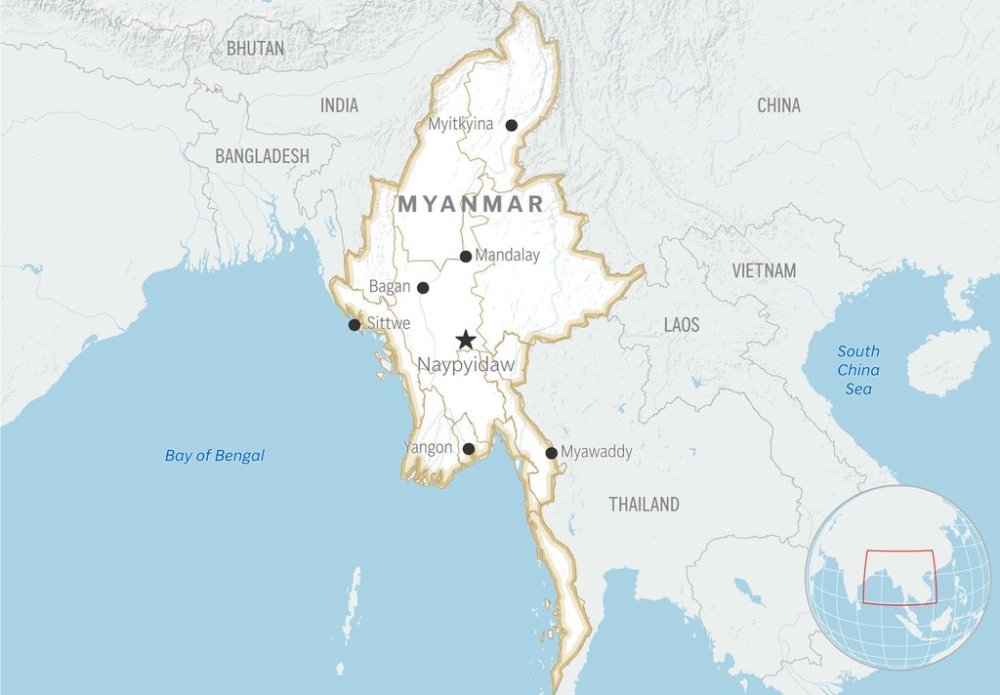Myanmar’s military rulers grant a mass amnesty ahead of election
Advertisement
Read this article for free:
or
Already have an account? Log in here »
To continue reading, please subscribe:
Monthly Digital Subscription
$0 for the first 4 weeks*
- Enjoy unlimited reading on winnipegfreepress.com
- Read the E-Edition, our digital replica newspaper
- Access News Break, our award-winning app
- Play interactive puzzles
*No charge for 4 weeks then price increases to the regular rate of $19.00 plus GST every four weeks. Offer available to new and qualified returning subscribers only. Cancel any time.
Monthly Digital Subscription
$4.75/week*
- Enjoy unlimited reading on winnipegfreepress.com
- Read the E-Edition, our digital replica newspaper
- Access News Break, our award-winning app
- Play interactive puzzles
*Billed as $19 plus GST every four weeks. Cancel any time.
To continue reading, please subscribe:
Add Free Press access to your Brandon Sun subscription for only an additional
$1 for the first 4 weeks*
*Your next subscription payment will increase by $1.00 and you will be charged $16.99 plus GST for four weeks. After four weeks, your payment will increase to $23.99 plus GST every four weeks.
Read unlimited articles for free today:
or
Already have an account? Log in here »
BANGKOK (AP) — Myanmar ’s military rulers have granted amnesty to more than 3,000 political prisoners locked up for opposing army rule and dropped charges against over 5,500 others ahead of next month’s election, state media reported Wednesday.
An official from Yangon’s Insein Prison, who spoke on condition of anonymity because he is not authorized to release information, told the AP on Thursday that prisoner releases would begin that day, but he did not provide the numbers and names of inmates to be freed. In some past amnesties, releases have taken several days.
Outside of Insein Prison, which for decades has served as the main place of detention for political prisoners, dozens of people gathered Thursday morning to welcome friends and relatives who were being freed under an amnesty.

It was not immediately clear whether the prisoner release would include former leader Aung San Suu Kyi, who has been held virtually incommunicado since the military’s seizure of power in February 2021.
State-run broadcaster MRTV said Wednesday that the amnesty was granted “to ensure that all eligible voters do not lose their right to vote and can cast their votes freely and fairly in the upcoming multi-party democratic general election” on Dec. 28.
MRTV said Myanmar’s State Security and Peace Commission, which functions as the authority overseeing the transition to elections, granted amnesties covering 3,085 prisoners convicted under Section 505(A) of the penal code.
The provision, known as the incitement law, makes it a crime to spread comments that create public unrest or fear, or spread false news.
Many political detainees have been held on a charge of incitement, widely used to arrest critics of the government or military and punishable by up to three years in prison.
A total of 724 prisoners were given conditional release, meaning any future offense will require them to serve both the remaining portion of their original sentence and any new sentence, according to the announcement.
A separate announcement said 5,580 people – either being prosecuted under the same charge or in hiding after being prosecuted under the charge, also will receive amnesty and have their cases closed.
Critics have asserted that the election will be neither free nor fair because there is no free media and most of the leaders of Suu Kyi’s dissolved National League for Democracy party have been arrested.
Some 22,708 political detainees, including Suu Kyi, were in detention as of Wednesday, according to the Assistance Association for Political Prisoners, an independent organization that keeps detailed tallies of arrests.
The 80-year-old Suu Kyi is serving a 27-year sentence after being convicted in what supporters have called politically tinged prosecutions.
The army takeover in 2021 was met with massive nonviolent resistance, which has since become a widespread armed struggle.

